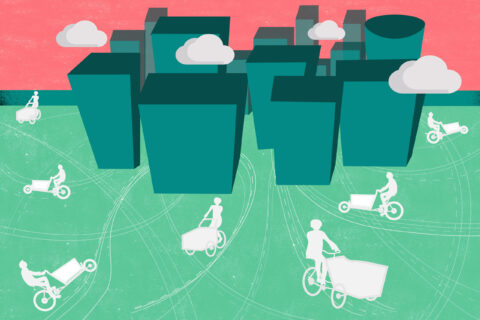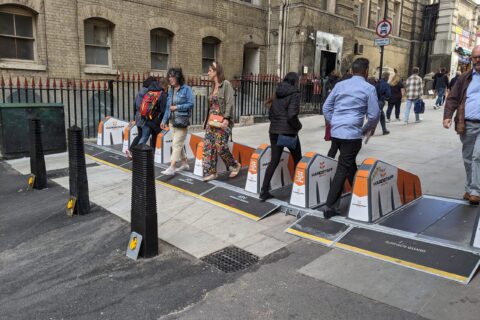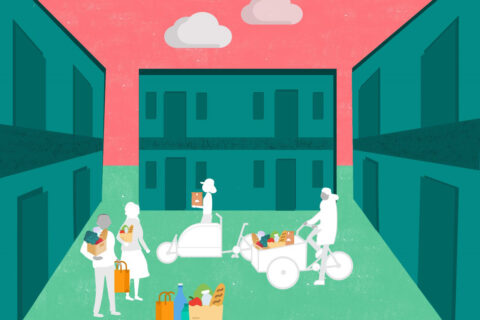In the second of our two-part series on cargo bikes in London, Fare City want to know ‘What will promote or prevent a wider uptake of non-commercial cargo bike use in London?’ To answer this question, we have cut a qualitative cross-section through the topic, which draws upon extensive interviews with key stakeholders and is underpinned by London-specific policy and insight. Fare City ultimately believe that cargo bikes are accessible, equitable and sustainable modes of city transport and that they do have the potential to become a more commonly used mode of transport for Londoners.
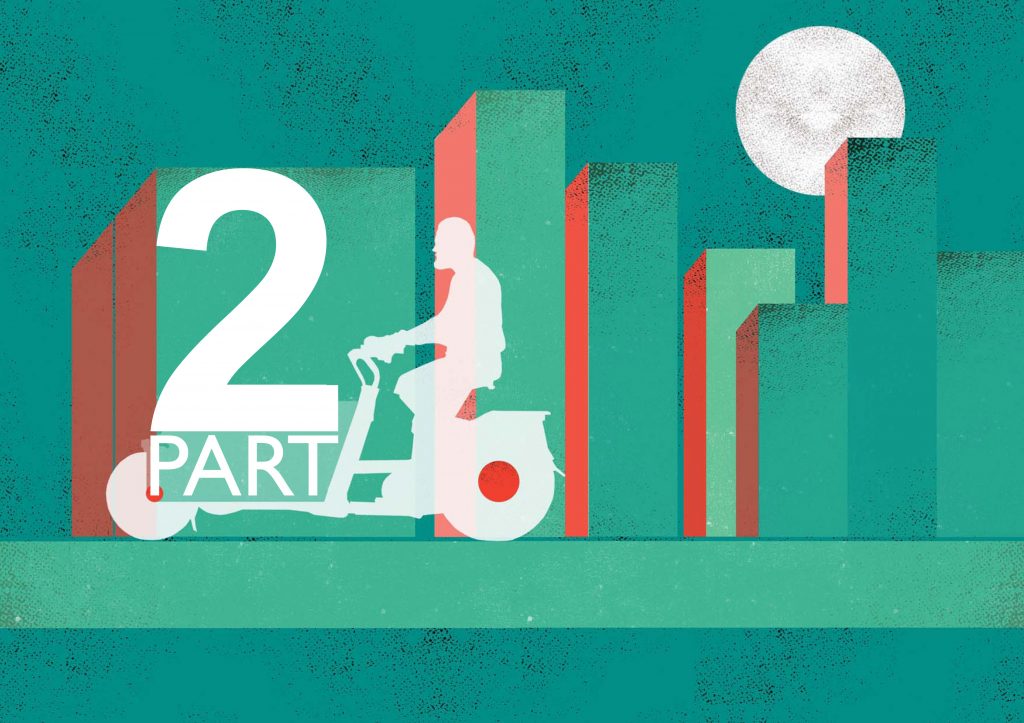
I’m sitting in a bike shop which occupies the ground floor of a smart brick building on Eversholt Street, a stone’s throw from London’s Euston Station. It’s a Tuesday afternoon and I’m talking to Harry Walton, owner of Flying Dutchman, a bike business which, he is keen to point out, “does not sell bikes for cyclists”. This is a subtle, yet important, distinction. In the ensuing two-hours, the conversation ranges from his time spent as a student repairing bikes in Amsterdam, to the kind of future which we as humans want for ourselves, amid the onset of autonomous vehicles and artificial intelligence.
While we do discuss cargo bikes at length, the conversation keeps coming back to the choices which we make, and our reasons for making them: “The path that was put before me (getting a driving license) is considered a rite of passage…most people are given the route of the car and they accept it”. Walton made a conscious decision to reject this route, preferring to cycle instead. But for many Londoners, the option of cycling just isn’t that appealing, despite a discernible shift away from obtaining a driver’s license and owning a car.
The culture of the car in London, and the UK more broadly, is just one of many interdependent factors which are contributing to the slow uptake of cargo bikes on the capital’s streets. While Part One of this two-part series identified who uses cargo bikes in London and why, Part Two examines both the personal issues and the policy issues which will either promote or prevent a wider uptake in the non commercial sector. These issues include safety, regulation, infrastructure, demand and culture.

Safety, Regulation & Infrastructure
The most visible issue is safety. Two of Walton’s customers, Tim and Carl, are West London fathers, who both believe that cargo bikes are safer than regular bikes. Tim asserts that he’s “more visible on a big bike and will own the road”. He further states that he rides the bike “like he drives a car”, while Carl believes that “if you can ride a normal bike you can ride a cargo bike”. The comparison between cargo bikes and regular bikes is important. This is because it is apparent that the success of cargo bikes will be largely dependent on that of regular bikes, especially regarding how safe Londoners feel on the city’s streets.
Michael Barratt is Transport for London’s (TfL’s ) Development Assessment Impact Manager. Part of his job is to assess the fitness for purpose of temporary cycle routes, which have been implemented across the city as a result of London’s many construction sites. This is specifically with a view to larger cycles, including cargo bikes. He will often take constructors out in a group on bikes to highlight both common and more specific issues which arise: “We have a broad demographic attending the rides…some cycle for fun at the weekend and others not at all…from the pre-ride discussions the idea of cycling being a form of transport was dismissed by many due to safety concerns”.
True to the view of many in Barratt’s cycle groups, fear of collision was, in fact, identified in TfL’s 2018 ‘Cycling Action Plan’ as being one of the biggest factors which prevents Londoners from cycling. Alison, a West London mother of three, relayed her experience of being “hit by cars twice on this (cargo bike) in the last year”. Like Alison, Carl is an experienced cyclist who describes the school run on his cargo bike as “bloody terrifying…you get the 4×4 drivers, (and) even though they recognise me, they still pass close”.
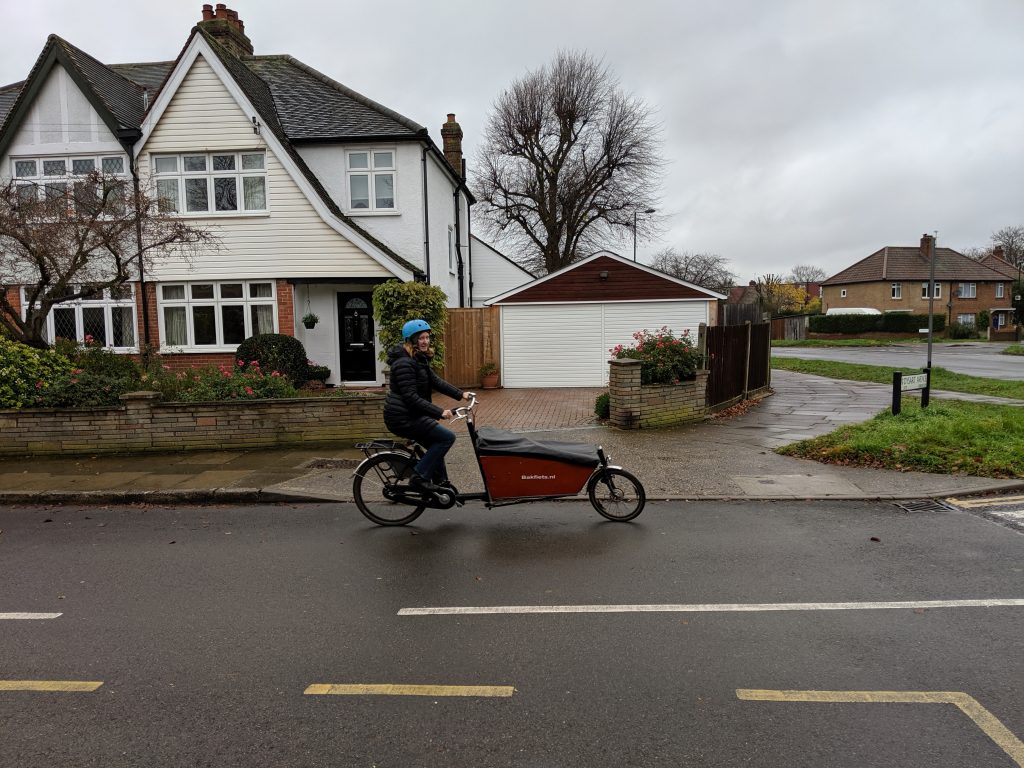
When I relay Alison and Carl’s experiences to Flying Dutchman’s Harry Walton, he is unsurprised. Walton reflects that “the road is a very moral place, and bikes seem to upset the moral structure: we filter through traffic, we have those little boxes at the front of lights and we do not pay ‘road tax’ ”. Some of the respondents in Barratt’s cycle group suggest that those on bikes do not always obey the rules of the road, something which Barratt himself considers all road users as being equally culpable of: “This is an issue across the board, e.g. walking whilst texting, excessive motorbike, car and HGV speeds, as well as red-light running. We all need to be more considerate, whichever mode we choose”.
Aside from the actions of road users, would greater regulation of cycles generally, and cargo bikes more specifically, perhaps be the answer to improving safety? In the commercial sector, Pedal Me’s co-founder Ben Knowles is unsure: “We regulate ourselves and, if we didn’t, then it wouldn’t make sense from a business point of view”. Indeed, Knowles’s cargo bike courier company is leading the way and has developed protocols, including the use of bike nameplates, rigorous training and a soon-to-be automated near-miss log – measures which some competitors are beginning to adopt.
Knowles’s view appears to be supported by some of the respondents in the Department for Transports (DfT’s ) 2019 ‘Last Mile’ paper, who agree that while ‘there was a need for common standards…it was too early to prescribe standards without stifling innovation’. However, as a sign of just how quickly the sector is moving, TfL’s Michael Barratt does believe that regulation among commercial cargo bike users is now crucial.
Barratt asserts that if the potential of cargo bikes is to not only be realised but, more importantly, be supported by the wider public, then regulation of the commercial sector simply needs to happen. “There have been some negative comments on social media; hence, (we are) setting up the (cargo bike) working group…This will help ensure (that) loads are within accepted tolerances…to ensure the right message requires the right approach”.
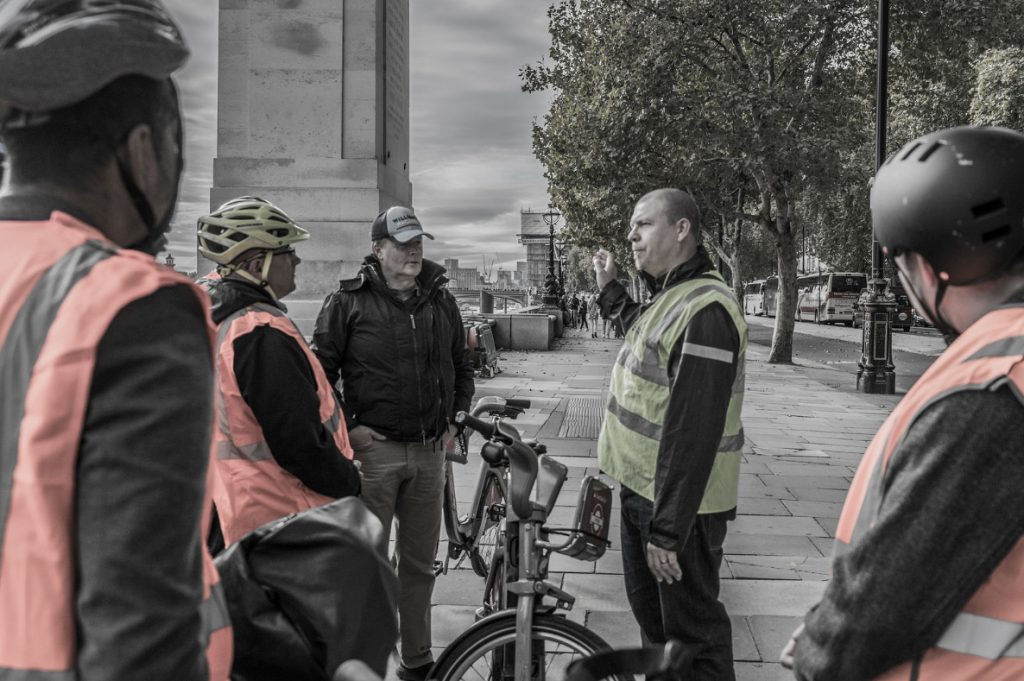
A stipulation for commercial recipients of the DfT’s eCargo Bike Fund is that cargo bike users must have completed Bikeability ‘Level 3’. But what about training for users in the non-commercial sector? The need for some training in helping potential users transition from a regular bike to a cargo bike is one area which all interviewees agreed upon. Pedal Me are developing an external syllabus for non-commercial users, such as families, while Flying Dutchman’s Harry Walton believes that cargo bikes “just need to be introduced to you in the right way…this is one reason why we work with appointments because people need that level of attention”.
When I ask him what he considers to be the biggest barrier for owning a cargo bike, Walton flatly replies “Theft. People don’t want to spend so much on something that might be stolen – that’s their number one concern”. Indeed, after safety, the fear of theft scores highly in TfL’s 2018 Cycling Action Plan, while ‘more than half of Londoners are deterred from cycling due to a lack of cycle parking’. For several respondents, the lack of cargo bike parking and the danger of theft ranked highly and was enough to prevent one interviewee from purchasing a cargo bike, despite trialling several.
Gwyneth is a West London mother of two who spent three weeks trialling two different types of cargo bike but ultimately settled on an electric bike. “Where we live, there’s just nowhere to park…I had to lock the (trial) bikes down the road by the bus stop, it was a worry for the three weeks I had them”. While Londoners with regular bikes may ordinarily be able to carry them upstairs and store them in hallways or front rooms, the sheer size, and weight, of even the smallest cargo bike can make this prohibitive.
Fellow West Londoner Tim suggests that the sheer weight of a cargo bike is a deterrent to many would-be thieves, especially when coupled with a shopping lock. While this is a distinct advantage of using a cargo bike in London itself, there are several recent examples of cargo bikes being stolen from people’s front gardens, as confirmed by Walton: “Thieves are professional now, there’s no limit…these aren’t kids with bolt cutters, these are three guys with a van coming at night”.
Walton does, however, believe that there are ways around this issue: “I’ve known people contact the local church and they’ve been allowed to lock it up around the back, to store it on private land… alarmed locks are also particularly efficient”. With so many Londoners without secure home parking, the worry of storage, and the fear of theft, are arguably turn-offs. This is where the authorities, and local councils in particular, could take the lead, something which Gwyneth did, in fact, challenge Richmond Council over: “we live in a CPZ (controlled parking zone), and I did request bike hangars instead of parking spaces, but to no avail”.
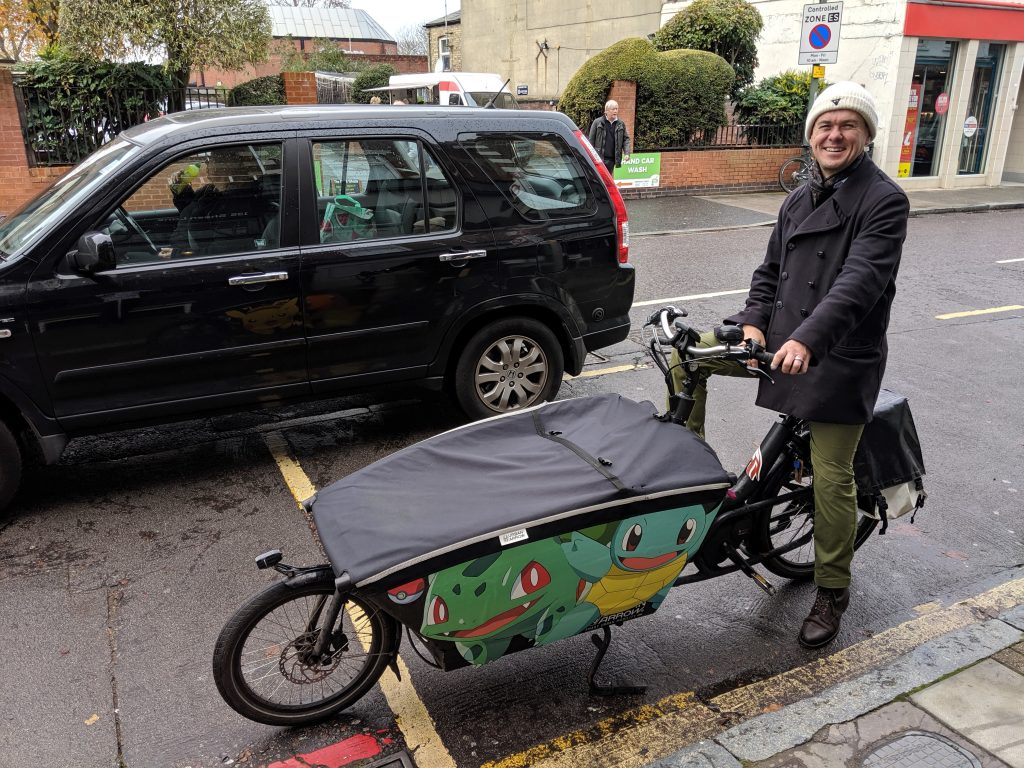
While some councils have been more pro-active than others in encouraging cycling via specific projects, it is TfL who are responsible for managing the capital’s roads. TfL’s 2018 ‘Cycle Freight Study’ cites the need for ‘segregated routes’ and cycle access points to ‘include dropped kerbs…to assist these vehicles.’ Similarly, TfL’s 2018 Cycling Action Plan promises to deliver ‘more than 450km of new, high quality cycle routes across Greater London’. Though this sounds promising, how much of this will be truly accessible to those using non-standard cycles – including cargo bikes?
A key aim of TfL’s Michael Barratt is to ensure that inclusivity features prominently in the sites which he works on. One of his projects, No. 1 Blackfriars Road, featured collaboration between a range of stakeholders, including Pedal Me and Wheels for Wellbeing. The scheme successfully delivered an innovative solution, which ensured that those on non-standard cycles could still use a dedicated cycle lane, despite ongoing construction works. Indeed, it is this collaborative approach that TfL will need to embed within their delivery of city-wide cycling infrastructure if the needs of all who cycle are to be genuinely catered for.
Demand & Culture
During my interview at Flying Dutchman, Walton turns several prospective customers away: “I’m afraid we’re closed on a Tuesday,” he says, before returning to carry on repairing a very ordinary-looking bike. I go on to ask him a bit about the customers he supplies bikes to and what their motivations are: “Ours are different because other bike shops only sell leisure products, which is why we have such a strong USP in this shop – because that’s exactly what we don’t do”. Walton goes on to speculate that as many as “95% of (Flying Dutchman’s) customers use their bikes purely as a means of transport”.
Walton’s vision for Flying Dutchman is to promote ‘utility cycling’, a back-to-basics approach where the bike is an entirely functional part of a user’s daily life. This is something which is commonplace in the Netherlands, but viewed suspiciously here in the UK: “The concept of the utility bike is new and people still look aghast at me as I cycle around with a girlfriend on the back or a dog on the front – it’s just alien”. Cargo bikes form a big part of this vision, and Walton explains that “a lot of our first customers were continental; German, Dutch, Belgian and French – it was part of their culture”. British customers, he says, came afterwards: “They first had to see that it was possible”.
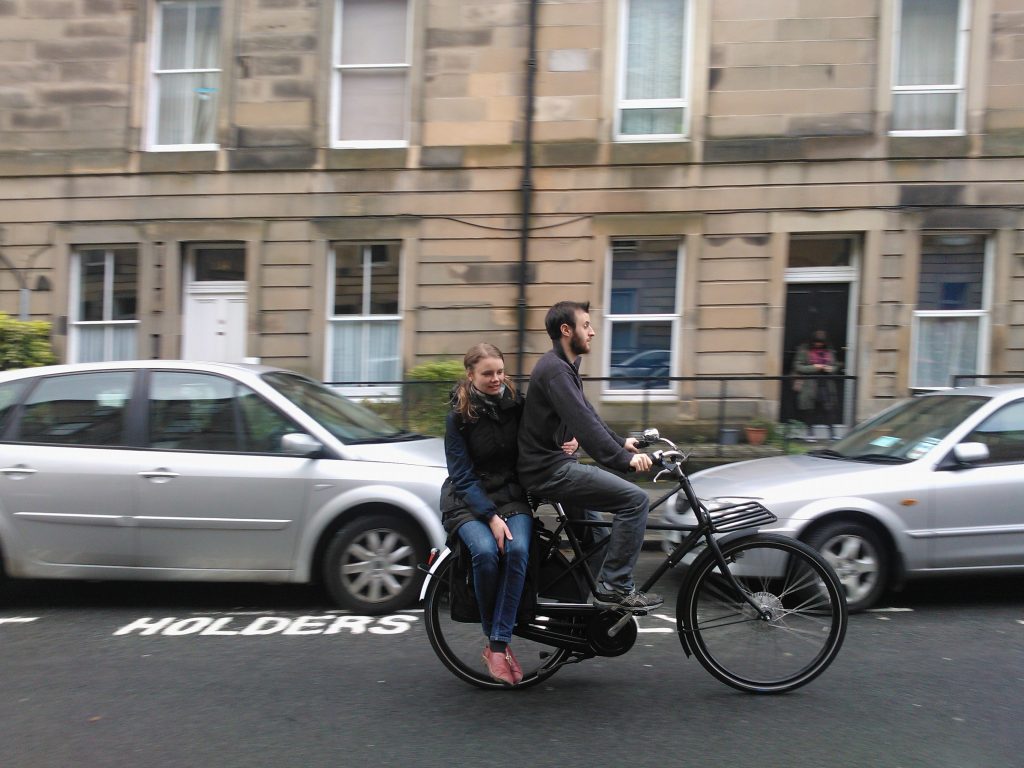
Regardless of nationality, many Londoners just don’t consider cycling to be a viable form of transport, with many respondents in TfL’s 2018 Cycle Action Plan subscribing to the idea that ‘cycling (is) not seen as convenient compared to other alternatives’. This is a view which many of those I interviewed were keen to dispel, including West Londoner Tim: “People need to understand that it is not about being wedded to a bike, it’s about being able to do the things you want to do more easily”. This is also a source of frustration for Pedal Me’s Ben Knowles, who laments that “people just don’t understand the potential of cargo bikes”.
Both Walton and Knowles agree that the best way to promote cargo bikes is for the bikes to be seen out and about on the city’s streets. It is, however, only recently that cargo bikes have been introduced to the wider public in more accessible ways. In August 2019, TfL held their inaugural ‘Best Cargo Bike Competition’, which aimed to raise the profile of cargo bikes among non-commercial users. Then, just a month later, London held its first ‘Car Free Day’, which saw both commercial and non-commercial cargo bike users attend city-wide events, much to the delight of curious onlookers.
Perhaps the best advert for the uptake of cargo bikes among non-commercial users are the cycle-hire schemes that some London boroughs are running. Two boroughs in particular, Waltham Forest in the east and Ealing in the west, offer residents the opportunity to hire cargo bikes, but differ in the length of the hire and their requirements of riders. These schemes are, however, few and far between, while cargo bike suppliers are similarly thin on the ground, as confirmed by West London mother of two Gwyneth: “There’s nowhere like this (a cargo bike shop) in South West London, so I had to take these bikes on the Overground from Hackney to Richmond”. She did add that, while it was a struggle, “I was a good advert for the bikes”.
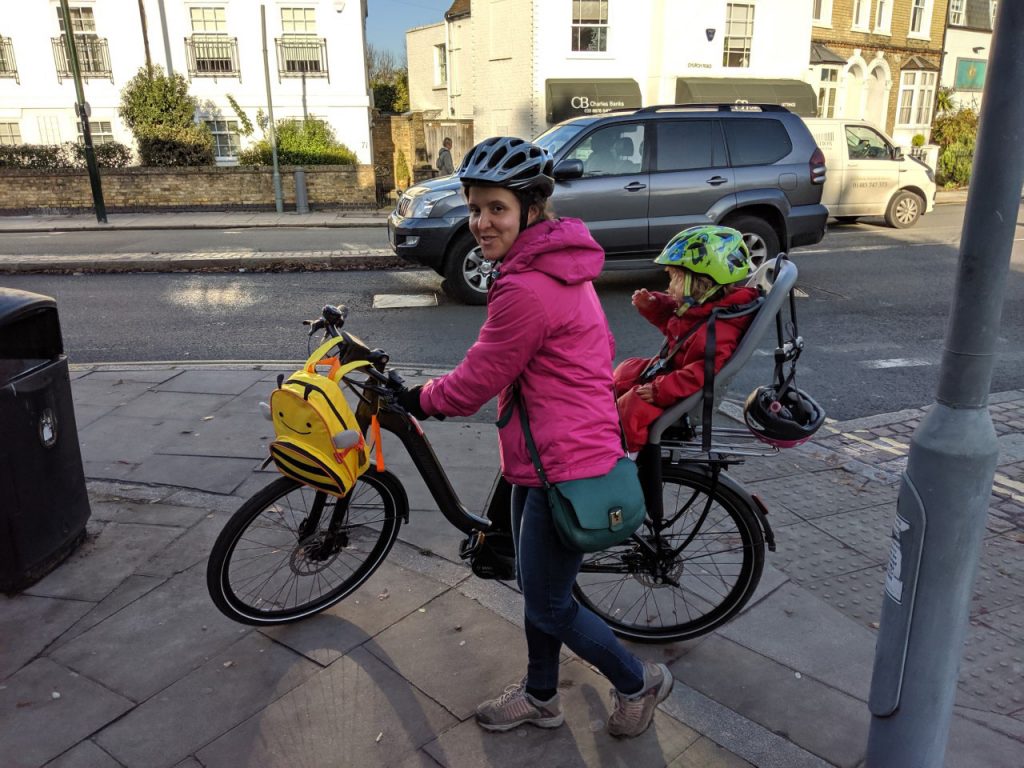
Raising the profile of cargo bikes among Londoners is one thing, but enticing them to try, let alone to buy, seems to be another. It certainly seems that some of this reluctance can be attributed to attitudes about cycling more generally, rather than towards cargo bikes specifically. The distinction between being a ‘cyclist’ and being ‘somebody who cycles’ does appear to be an issue, not only in London but in the UK. Flying Dutchman’s Harry Walton confirms this distinction as being unique: “In the UK there is this culture of cycling as a leisure pursuit…but in the Netherlands you don’t really see many cyclists – lycra, helmet, clippy shoes and lightweight bikes – it’s very rare”.
Over the years, the UK’s tabloid press has fuelled anti-cycling sentiment in a way which Walton describes as “virulent”, an approach which has no doubt contributed to some Londoners’ negative perception of cycling. In TfL’s 2018 ‘Cycling Action Plan’ the single largest factor identified as preventing people from cycling was ‘Not identifying as a ‘cyclist’’. The study suggests that this was attributed to ‘The image of the stereotypical ‘cyclist’ (as being) off-putting to many’. TfL’s Michael Barratt believes that “we have habits of putting people into groups. To avoid labelling we are people who walk, cycle, use public transport and, occasionally, use the car”.
Barratt’s cycling group feedback sheds further light on this: “During discussions, many people found the cycle tracks a daunting venture due to perceived high cycling speeds”. However, he does think that rebranding the cycle ‘superhighways’ to ‘cycleways’ will “help change the way cycle tracks are viewed and to be there for everyone. Once this is realised, I would expect more to take up cycling as a form of transport”.
While most of those that I interviewed are clearly passionate about cycling, several, including Gwyneth and Rachel – whose children regularly use Pedal Me’s passenger service – are not. Gwyneth confirms that “I only ride to get somewhere, I’m not a lover of riding a bike.” In describing a near-miss with an inconsiderate car user, she asserted: “I’m not a cyclist, I’m a person”. In our interview, Rachel muses: “Would I say I’m a keen cyclist? No, I’m an entirely pragmatic cyclist; I just cycle because it’s the best way of getting around”.
There are clearly other issues which may prohibit the uptake of those that cycle and, by extension, use a cargo bike, other than whether Londoners identify with being a ‘cyclist’ or not. There is a perception among some Londoners that cycling is still the preserve of white, middle-class, middle-aged males, as supported by TfL’s 2018 Cycle Action Plan: ‘Cycling does not yet reflect London’s great diversity. There is still a higher proportion of men cycling than women; a higher proportion of white people than black, Asian and minority ethnic (BAME) people”.
All of the cargo bike users and owners that I interviewed, were both white and middle-class, while Flying Dutchman’s Harry Walton confirms that “though we do have customers from other backgrounds (purchasing cargo bikes) it is literally a handful of Asian women, a handful of black women and one black man”. The associations between gender, ethnicity and class can also lead to other reasons which may prohibit cargo bike use, the most obvious one being cost. Walton’s stock ranges from £1,500 for a non-electrically assisted cargo bike, through to £5,000 plus for a top of the range model.
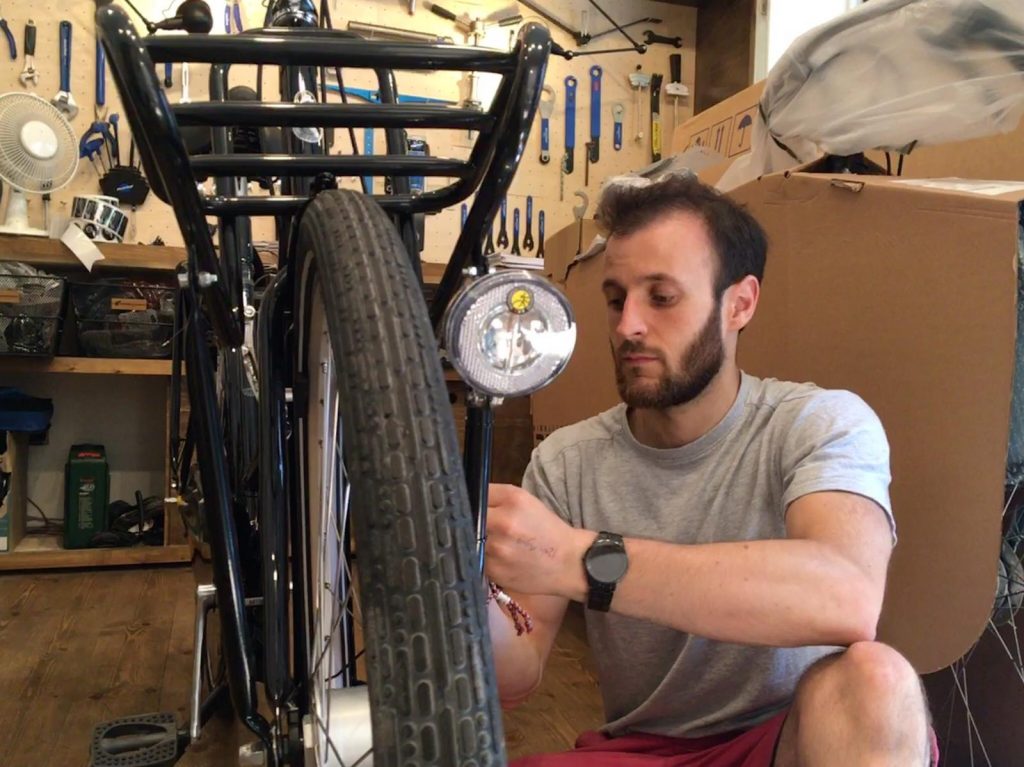
Given that cargo bikes typically retain their value, meaning that second-hand models can be almost as expensive as buying new, I ask Walton whether he thinks that some customers consider cargo bikes to be a luxury purchase? He admits that some customers do, but for the majority, they are very much considered a necessity: “The cost of a cargo bike used to only be justified as a car replacement to take the kids to school – kids were the golden ticket”. There are, he says, people that will come in and “drop crazy money” on cargo bikes, but at the end of the day the company’s philosophy, shared by many of its customers, is that “they are not expensive bikes – they are cheap cars”.
Fare City Recommendations
True to the nature of my conversation with Walton, perhaps the crux of the cargo bike question lies in the type of future that Londoners want, the choices that they make and their reasons for making them. In addition to a decline in car ownership, the last decade has also seen the emergence of a transport ‘disruptor’ movement, which has seemingly enveloped the capital’s streets. The result has been a sharp increase in app-based car hire services and dockless bikes, which have presented both opportunities and problems for city authorities and customers alike.
Though London has retained control of this movement more effectively than other global capitals (e.g. the introduction of the ULEZ, Uber’s ongoing licensing issues and the illegality of scooters on the city’s roads), the future of mobility in the capital is still as speculative as it is multi-faceted. The question is therefore two-fold: where do cargo bikes slot into this mobility milieu, and how?
Fare City believe that cargo bikes are fundamentally accessible, equitable and sustainable modes of city transport. However, if they are to become a more commonly used mode of transport among Londoners, then the following steps should be taken:
1. Stakeholder collaboration must underpin strong leadership to prioritise cycling in London
The cycle, in its many different guises, has the potential to become the most inclusive mode of transport available to all Londoners. It is, therefore, crucial that city leaders listen to, and work with, key stakeholders in firstly unlocking and then leveraging this potential. City leaders need to forego the political short-termism associated with prioritising car use and, instead, pair London’s growing appetite for sustainable lifestyle choices directly with cycling. The London 2020 mayoral election is the opportune moment for these choices to be identified, promoted and then realised in conjunction with cycling.
2. Londoners must be enticed to cycle.
First, there is a need to provide genuinely inclusive city-wide cycling infrastructure – especially,
on-street cargo bike parking in residential areas. Second, both the case for cycling generally, and cargo bike use specifically, must be presented as an enticing option for all Londoners via mainstream media campaigns and public events. Third, cargo bike incentivisation schemes and access to training for non-commercial users must be prioritised. Groups which don’t traditionally identify with cycling (e.g. BAME, low income) should be consulted and offered the option of additional support and further economic incentives.
3. Cargo bikes must be an integral part of a multi-modal London
A key reason for the success of cargo bikes in the commercial sector is the ‘last mile’ role which the bikes fulfil. This is essentially their ability to complete the final part of a longer journey which has featured other modes of transport at an earlier stage. This is especially relevant to London, given the greater distances between the outlying suburbs and the city centre. Designing for this, by providing dedicated cargo bike parking at public transport interchanges, will encourage users to consider a cargo bike as part of a longer, multi-modal journey.
Fare City would like to thank all interviewees who kindly gave up their time to take part in this study.



